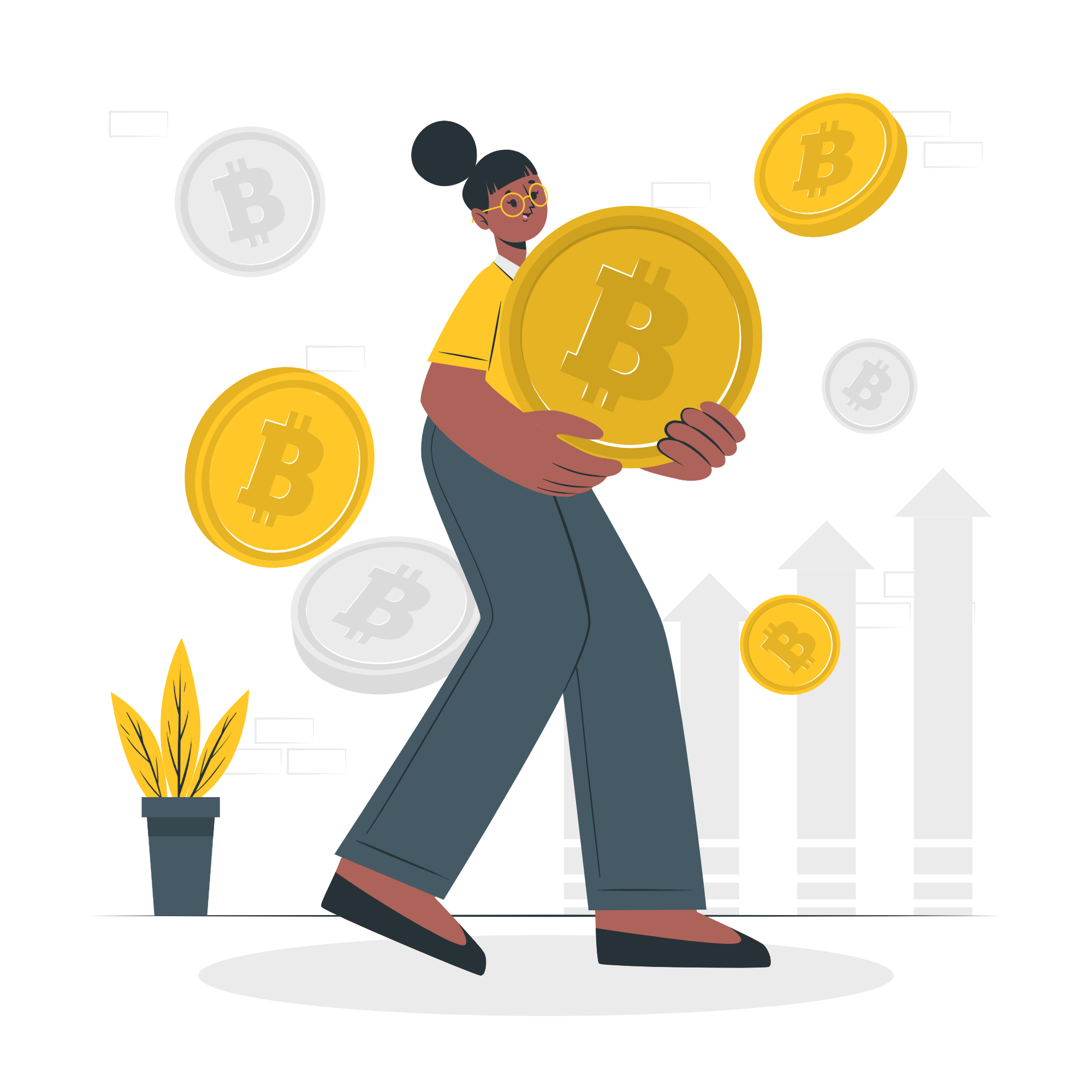WHY SHOULD I BUY BITCOIN?
Oftentimes when people speak about the next wave of mass adoption in the crypto sphere and how Bitcoin will lead the charge, I can not help but argue otherwise. Understandably, their expectations are justified. Bitcoin has its merits. It is old(trusted), stable, decentralised and secure, etc and I do not discredit these things. In fact, I understand why these things appeal to a large group of individuals, however, it is not enough to bring about widespread adoption of cryptocurrency.
I have seen the narrative about Bitcoin change over the years from being a seamless and borderless means of exchange to now a store of value. These narratives have not held up for too long because Bitcoin has not delivered on those claims. Bitcoin is not a true store of value because it is volatile. It might be one of the safest means of transferring value but certainly not the fastest.
From a layer 1 perspective, Bitcoin is king. A solid base layer allows for easy and safe development of layer 2 (smart contracts). However, I will argue that many other base-layer networks meet the blockchain standard (speed, security, and scalability) and are rapidly developing their layer 2 to a point where Bitcoin cannot keep up. Smart contracts (layer 2) are an integral part of the development of the crypto industry as they foster innovation, investment and adoption.
The crypto industry will move past the Bitcoin narrative/hype. It is a certain fate for all layer 1 protocols/businesses i.e manufacturing, mining, and cloud computing. This is because they are boring businesses/protocols. When developed they hardly change. In a capricious and volatile industry like crypto ‘stability’ is not good for business. The hallmark of emerging technology is constant innovation to bring about mass adoption, and Bitcoin has seemingly stopped innovating and is living off its first-mover advantage.
In an emerging market, when an organization or business stops innovating it allows other businesses (that are innovating) to catch up or surpass it. This is what we are currently experiencing in the crypto industry. Although Bitcoin accounts for over 40% of the entire crypto market cap, it isn't the most active and developing blockchain in the world. This has a long-term implication for the blockchain as many alternatives are getting better at creating, storing and transferring value.
One of the major threats to bitcoins long-term success is its inaccessibility i.e it is difficult to mine, transfer and buy (due to its high price). Ethereum has a similar problem but they solved this by creating EVM/smart contracts which makes it the most accessible blockchain (indirectly) in the world.
I have had no real reason to own Bitcoin. I do not believe it is a good store of value mainly because of its volatility despite being the best-performing asset of 2022, much of which has been eroded by the bear market.
Also, Bitcoin is not the best medium for value exchange. You can make a case for its layer 2--the lighting network but its functionality and usability are debatable. I would rather buy, hold and (even) speculate on a low-cap coin like Hive that grants me access to one of the most active crypto communities in the world; allows me to perform fast and feeless transactions; the ability to hedge against inflation via HBD savings, and access to an array of dapps.
So in a nutshell, having the most decentralized network (due to the first-mover's advantage), the largest market cap and a bunch of loyalists might seem sufficient in the short term, but platforms/blockchains that are innovating consistently have a higher chance of attracting more users and by implication increasing positive network effect.
With that being said, speculation plays a huge role in value assignment, especially in the crypto industry. So it can be argued that not owning Bitcoin is counterintuitive considering its visibility to crypto normies and the mass media.
The essence of this post is not to discredit Bitcoin (although I might have done that indirectly) but to show how the future of crypto is still very open. The fact that Bitcoin played an important role in bringing cryptocurrency this far doesn't mean it has what it takes to get the industry where it needs to be--in every household. Adoption is key in the overall development of the crypto industry and Bitcoin is not playing any major role in bringing the masses closer to cryptocurrency/blockchain technology.
Exciting news! The #Leofinance Crew3 campaign just got even better with an increased prize pool! Join now and earn your share of the rewards while learning about the world of #cryptocurrency. Use my link to sign up: https://zealy.io/c/leofinance-4960/invite/Al30BB3V8WeATx6vpubKT

Posted Using LeoFinance Beta
Posted Using LeoFinance Beta



This post has been manually curated by @bhattg from Indiaunited community. Join us on our Discord Server.
Do you know that you can earn a passive income by delegating your Leo power to @india-leo account? We share 100 % of the curation rewards with the delegators.
100% of the rewards from this comment goes to the curator for their manual curation efforts. Please encourage the curator @bhattg by upvoting this comment and support the community by voting the posts made by @indiaunited.
I believe is worth at least exposing yourself to a small portion of your portfolio for the potential upside.
Sure it is. I am not ruling that completely. In fact, it is a must have. However, in the long-run, I see the crypto industry shaping up differently than most people expect, with Bitcoin not leading the charge.
Nice one, bro. I don't have Bitcoin but I'm not loud about it because I'm sure I don't have the money to buy decent volume of it.
Nonetheless, I always tell myself that if I was to go back to 10 years ago, all my money would be channeled to Bitcoin for a start. Even at that, I would still have to sell 'em all and channel it into other places.
I recognize the reputation that goes with Bitcoin and I know it's value, but if I have a million dollars at the moment, I would rather use all of it to buy hive and stake it. Whatever I get as Curation reward in addition to the transaction cost would be more profitable now and on the long run compared to waiting for a bull-run in the Bitcoin market.
I stand to be corrected but most people buy Bitcoin (now) out of peer pressure and speculation. The only reason we talk about bitcoin today is because of its price action, and nothing more. So if I had enough to spare, bitcoin would not be in list of assets to buy. I would go the altcoin route.
Posted Using LeoFinance Beta
The only BTC I own is in a wallet I used to send to bittrex so I could buy HIVE, but then bittrex wouldn’t allow me to make the conversion, so I was stuck holding the BTC.
With that said, just last week I was looking into the timekeeping aspect of bitcoin, because I knew the protocol adjusts the difficulty every two weeks, but I wanted to know exactly how it does that.
When I saw how it’s done, I was impressed.
There is a built in incentive for miners to accelerate the clock, to shorten the average time between blocks while fooling the protocol into thinking a regular amount of time has elapsed, thus accelerating the disbursement of mining rewards.
Yet Satoshi’s original countermeasures are still in place and still very effective at keeping time, in a fully decentralized fashion.
I am interested to know this work. Based on my understanding timestamps are attached to the blocks verified by validators and are an important security feature on the chain, that allows for proper arrangement of blocks. If this can be tampered with, isn't it a security risk or am I interpreting this wrongly?
The protocol adjusts difficulty every 2016 blocks based on whether the average time between blocks was greater than or less than 10 minutes.
Every block has its own timestamp, inserted by the successful miner.
The trick is, if a miner successfully “solves” a block but the block’s timestamp is outside of two parameters (an upper and a lower), the block gets rejected.
That means the miner who tempts fate by trying to spoof an improper time risks losing their rewards.
The two parameters are based on the median timestamp of the previous 11 blocks and the median current time of all the nodes — one for upper, one for lower, can’t remember which is which.
As with the rest of the bitcoin protocol, as long as 51% of miners and nodes remain “honest” then a time based malicious attack will be a losing proposition.
The maximum allowed deviation is 2 hours. So a given block time could be off by that much. Over a two week time frame, that’s 0.6% maximum error.
Actually, that is not the case. Ordering of blocks has nothing to do with their timestamps. There are times when successive blocks have negative differential timestamps.
The timestamps are never a security risk. They are only used for adjusting the difficulty. The difficulty controls how long it takes (on average) to solve each block’s “puzzle”.
Successfully fudging timestamps would merely mean the 21 million BTC get fully dispersed sooner than originally planned.
So, it’s not a huge risk. Nonetheless, the way it keeps miners honest is impressive, given the fact that there are no time oracles per se, just nodes and miners.
Thanks for the explanation. I did a solidity course (which I never finished) last year which explained how blocks are produced and appended to a chain, but it was not this deep. I probably need to revisit it to see what I missed.